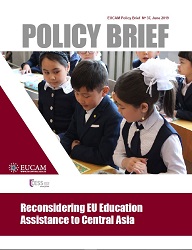Reconsidering EU Education Assistance to Central Asia
Reconsidering EU Education Assistance to Central Asia
Author(s): Sébastien Peyrouse
Subject(s): Government/Political systems, International relations/trade, Higher Education , State/Government and Education, Social development, Sociology of Politics
Published by: CEPS Centre for European Policy Studies
Keywords: European Union; Central Asia; education assistance; government; development of education; higher education; Bologna Process;
Summary/Abstract: Central Asia’s educational systems have been deteriorating since the collapse of the Soviet Union. All five Central Asian republics, to varying degrees, lack high-quality, effective education. Bad governance and pervasive corruption have added to the increasing disconnect between students’ training and employers’ needs. This is hindering the region’s human development and long-term economic stability. Education is a key area of cooperation between the European Union (EU) and Central Asia. Tertiary education has been the main focus of EU support to promote large-scale systemic reform to make Central Asian higher education systems compatible with the Bologna Process (aimed at inter-governmental cooperation on higher education in Europe in the broadest sense). However, most EU-proposed reforms have not been implemented by local governments.
Series: EUCAM - Policy Brief
- Page Count: 11
- Publication Year: 2019
- Language: English
- Content File-PDF

